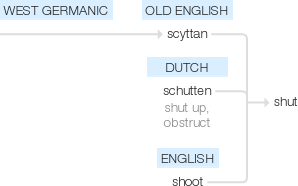Shut
Old English scyttan ‘put (a bolt) in position to hold fast’, of West Germanic origin; related to Dutch schutten ‘shut up, obstruct’, also to shoot.
wiktionary
From Middle English shutten, shetten, from Old English scyttan(“to cause rapid movement, shoot a bolt, shut, bolt, shut to, discharge a debt, pay off”), from Proto-Germanic *skutjaną, *skuttijaną(“to bar, bolt”), from Proto-Germanic *skuttą, *skuttjō(“bar, bolt, shed”), from Proto-Indo-European *(s)kewd-(“to drive, fall upon, rush”). Cognate with Dutch schutten(“to shut in, lock up”), Low German schütten(“to shut, lock in”), German schützen(“to shut out, dam, protect, guard”).
Variation of chute or shute (archaic, related to shoot) from Old English scēotan.
etymonline
shut (v.)
Old English scyttan "to put (a bolt) in place so as to fasten a door or gate, bolt, shut to; discharge, pay off," from West Germanic *skutjan (source also of Old Frisian schetta, Middle Dutch schutten "to shut, shut up, obstruct"), from PIE root *skeud- "to shoot, chase, throw." Related: Shutting.
Meaning "to close by folding or bringing together" is from mid-14c. Meaning "prevent ingress and egress" is from mid-14c. Sense of "to set (someone) free (from)" (c. 1500) is obsolete except in dialectal phrases such as to get shut of. To shut (one's) mouth "desist from speaking" is recorded from mid-14c.
